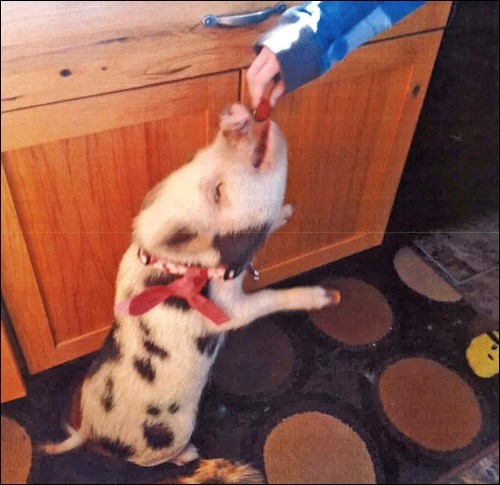Urban chickens may not have had a lot of success with North Battleford City Hall officials lately, but it is a different story for one urban pig.
A pig's owners scored a victory Monday, as North Battleford council voted 3-2 to allow a family to keep a pet pig in the city.
But the application reignited a debate that transpired at the previous council meeting on whether council and administration should allow domestic animals to be kept within the city limits.
The pig is a Juliana micro-pig, a type often kept as pets because of their small size. However, not every community allows the animals under their zoning regulations.
The application to council was made by a family moving to North Battleford from outside the community.
The applicants, Kevin and Tamara Mason, sought permission under the Animal Control Bylaw to keep a total of six animals in the city as pets — five dogs and the pig.
In their email correspondence to council the pig was described as completely litter trained and stays in the house to play with the dogs.
The pig was described as 26 inches long and 14 inches tall and fully grown. Pictures of the lovable-looking pig were circulated in a memo to council.
But the six animals were one more than the maximum allowed under the bylaw. Therefore, council’s approval was required to allow the extra animal.
The other complication was the Animal Control Bylaw’s provisions regarding “domestic animals” – those normally found on a farm environment. That bylaw provision came up two weeks earlier when council heard, and unanimously turned down, an application by a couple seeking approval to house two egg-laying hens in a backyard chicken coop within city limits.
Both “chickens” and “pigs” are among the animals referred to as “domestic animals” under the Animal Control Bylaw. Under its provisions, council’s written permission was needed in order for them to be kept in the city.
Initially a resolution on the issue wasn’t even before council, but City Clerk Debbie Wohlberg made clear the owners were expecting an answer that evening on what they could do.
As was the case two weeks earlier, council ended up divided on the issue of domestic animals.
Three councillors — Ryan Bater, Cathy Richardson and Kelli Hawtin — voted to allow the pig. Bater said in this case the pig was a household pet like a “parrot or cat or dog as far as I’m concerned,” he said.
But council set a number of conditions in its approval. One condition requires the pig to stay indoors at all times. The other condition was that if any of the animals died then the family is bound to a limit of five animals, as per the bylaw.
Much of the discussion at council concerned what the wording of the resolution should include. Don Buglas did not vote for approval, expressing concerns about the resolution’s clarity.
Mayor Ian Hamilton, on the other hand, was against the idea completely. He made it clear he saw little difference between the pig application and the chicken application that was turned down two weeks earlier.
“Where do you start and where do you stop?” asked Hamilton, who also pointed out the urban hen issue was one they “haven’t resolved yet.”
Hamilton’s “no” vote was not enough to sway his fellow councillors. The resolution allowing the pet pig and the five dogs, passed.
In addition to the pig issue, council also heard from Wohlberg about the pilot project in Edmonton allowing egg-laying hen licensing in that city. This was in response to the request from council for further information on the issue.
Wohlberg noted the Edmonton project granted a maximum of 50 licences for urban hens.
However, there was a mountain of regulations and time involved. Among other things, applicants had to first show they have taken an educational course in how to raise and keep chickens and must have a mentor available to assist with problems, and also advise the neighbours of their plans. The educational training in Edmonton is offered through the River City Chickens Collective.
In a memo to council City Manager Jim Puffalt reiterated administration’s recommendation from the previous meeting to keep chickens out. He said that logistically for a project similar to Edmonton’s, North Battleford “would have to send someone to take an acceptable hen laying course to be able to enforce the bylaws with Community Safety Officers being responsible to investigate complaints and take appropriate action.
“Regretfully, our recommendation from the previous meeting remains,” he stated.




